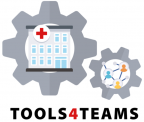Recruiting organisation: University of Bern, Bern, Switzerland
Supervisors: Prof. Dr. Guido Beldi, Prof. Dr Tanja Manser, Dr Sandra Keller
Doctoral Candidate: Lilien Schewski
Secondments: Bonn University Hospital (UKB) in Germany and REGION HOVEDSTADEN (Region H) in Denmark
Summary: Based on automatic speech analysis, we will develop a tool to give the surgeons a detailed, automatized and confidential feedback on their communication during surgical operations, with a particular focus on tense, potentially rude communication sequences. (1) Identification, in audio-recorded surgical operations, patterns of speech that coincide with sequences of tense communication. (2) Establish a validated methodology to automatically assess patterns of tense communication based on audio-recordings. (3) Establish a feedback system to inform surgeons on their communication patterns assessed based on audio-recordings of operations and visible immediately after the operations. (4) Develop short, automatic and confidential recommendations and training tips for the surgeons based on the specific feedbacks they receive after an operation.
Background
Teamwork in the operating room is a key aspect for patient safety. During surgical operations, tensions (from small remarks to open conflicts) may distract the team members and threaten patient safety. Based on automatic speech analysis, we will develop a tool to give the surgeons a detailed, automatized and confidential feedback on their communication during surgical operations, with a particular focus on tense, potentially rude communication sequences. (1) Identification, in audio-recorded surgical operations, patterns of speech that coincide with sequences of tense communication. (2) Establish a validated methodology to automatically assess patterns of tense communication based on audio-recordings. (3) Establish a feedback system to inform surgeons on their communication patterns assessed based on audio-recordings of operations and visible immediately after the operations. (4) Develop short, automatic and confidential recommendations and training tips for the surgeons based on the specific feedbacks they receive after an operation
Approach
The project will include: (1) a review of the literature on tensions and automatic identification of patterns of speech related to tense communication. (2) Analysis of audio recordings of surgical operations. (3) Development of a feedback tool.
During the PhD studies, the Doctoral Candidate will have the opportunity to spend a two month secondment at Bonn University Hospital in Germany (UKB) (Prof. Matthias Weigl) and a two month secondment at REGION HOVEDSTADEN in Denmark (RegionH) (Prof. Peter Dieckmann).
University of Bern and University Hospital
The main workplace will be University Hospital of Bern, department of visceral surgery. University Hospital of Bern works in close collaboration with the University of Bern. Our research group works in close collaboration with the FHNW School of Applied Psychology in Olten. University of Bern and University Hospital offer a highly dynamic research environment that supports interdisciplinary research and its translation into practice. It hosts the sitem (Center for Translational Medicine and Biomedical Entrepreneurship) and the ARTORG Center for Biomedical Engineering Research that conducts leading research on innovative technologies to be applied in healthcare settings. The research group at the Department for Visceral Surgery and Medicine has extensive experience in investigating teamwork in the operating room.
